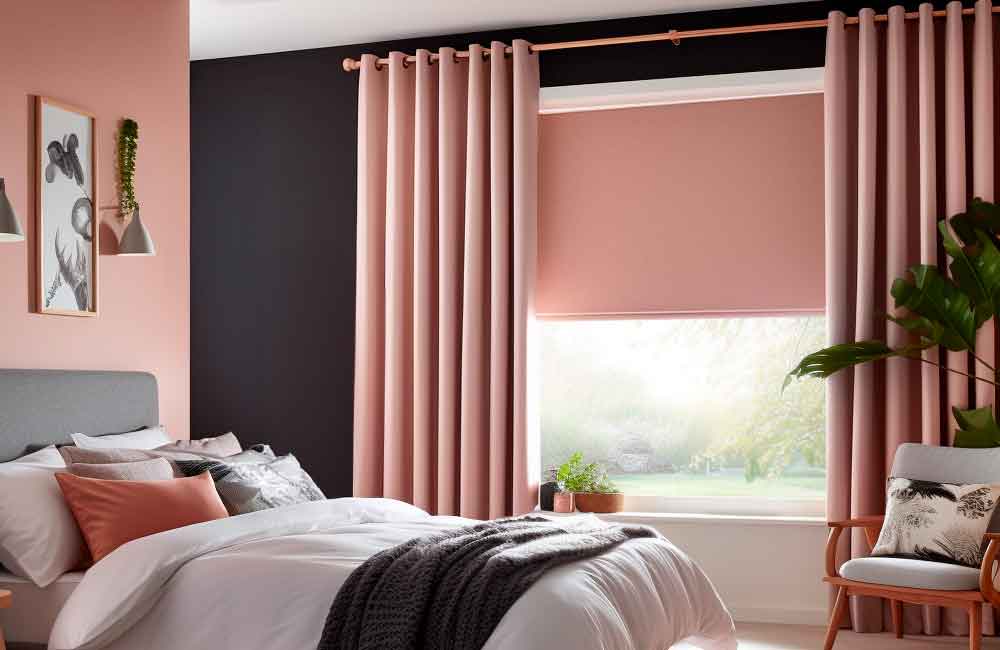Measuring & Fitting Included
Get an immediate price using our online estimator
Years’ of experience
Daytime, evening & weekend appointments
Call to speak to our call centre

Choosing the right window coverings for your space can greatly impact the overall look and functionality of a room. Two popular options that often come to mind are curtains and blinds. Both curtains and blinds offer unique benefits and can enhance the aesthetic appeal of any space. In this article, we will explore the differences between curtains vs blinds, their advantages and disadvantages, and provide insights to help you make an informed decision.
Curtains
Curtains are versatile window coverings that come in a wide range of fabrics, styles, and designs. They are typically made of heavier materials such as cotton, silk, or polyester, and can be sheer, semi-sheer, or opaque. Curtains are popular for their decorative appeal and their ability to add warmth and texture to a room.
Style and Aesthetics: Curtains offer endless possibilities when it comes to style and design. They are available in various colours, patterns, and textures, allowing you to customize your space to match your personal taste and interior decor.
Light Control: Depending on the fabric and thickness of the curtains, they can provide varying levels of light control. Thicker curtains with blackout lining are ideal for bedrooms or spaces where you need complete darkness, while sheer curtains allow natural light to filter through.
Insulation: Curtains can provide insulation by acting as a barrier between the outside and inside temperatures. During hot summers, they can help keep your space cool, while in the colder months, they can trap heat and improve energy efficiency.
Sound Absorption: The fabric of curtains can absorb sound, helping to reduce outside noise and create a quieter environment within your space.
Maintenance: Curtains require regular maintenance such as washing, ironing, and occasional dry cleaning, depending on the fabric. Some delicate fabrics may also require professional cleaning.
Dust and Allergens: Curtains tend to accumulate dust and allergens over time, which may require more frequent cleaning, especially for individuals with allergies or respiratory sensitivities.
Space Requirements: Curtains require adequate space to hang and stack when pulled open. If you have limited wall space or furniture near the windows, curtains may not be the most practical option.
Blinds, on the other hand, are window coverings made of slats or vanes that can be adjusted to control light and privacy. They are available in different materials such as wood, aluminium, vinyl, or fabric, offering a wide range of styles and options to suit various preferences.
Light Control: Blinds provide precise control over the amount of light entering a room. By tilting the slats or vanes, you can easily adjust the angle to allow natural light while maintaining privacy.
Privacy: Blinds offer better privacy compared to sheer curtains, as they can be fully closed to prevent outsiders from looking into your space.
Easy Maintenance: Blinds are generally easier to maintain compared to curtains. Regular dusting or wiping with a damp cloth is usually sufficient to keep them clean. Additionally, blinds made of materials like aluminium or vinyl are moisture-resistant, making them suitable for humid environments like bathrooms and kitchens.
Space Efficiency: Blinds are a great option for spaces with limited wall space or furniture near the windows. They can be neatly stacked at the top of the window, allowing for maximum use of the available space.
Limited Style Options: While blinds offer a variety of materials and colours to choose from, they may not provide the same level of decorative options as curtains. Blinds are generally more minimalistic and may not suit certain interior styles or preferences.
Less Insulation: Blinds, especially those made of lightweight materials like aluminium or vinyl, may not provide the same level of insulation as curtains. This can result in less energy efficiency and potential heat loss during colder months.
Noise Reflection: Unlike curtains that absorb sound, blinds may reflect noise due to their hard surface. This can potentially create a louder environment within your space.
When deciding between curtains and blinds, it’s important to consider your specific needs and preferences. Here are some factors to consider:
Functionality: Determine your primary requirements. If light control and privacy are your top priorities, blinds may be the better choice. However, if you value style, insulation, and sound absorption, curtains might be the more suitable option.
Aesthetic Appeal: Consider the overall aesthetics of your space. Curtains can add a touch of elegance and softness, while blinds offer a modern and sleek look. Choose the option that complements your interior design and enhances the visual appeal of your space.
Maintenance: Consider the level of maintenance you are willing to commit to. Curtains generally require more cleaning and care compared to blinds. If you prefer a low-maintenance option, blinds may be the better choice.
Space Constraints: Evaluate the available space around your windows. If you have limited wall space or furniture near the windows, blinds can be a space-efficient option. However, if you have ample space and want to create a more dramatic effect, curtains may be the way to go.
In conclusion, both curtains and blinds offer unique advantages and disadvantages. Ultimately, the choice between the two will depend on your specific needs, style preferences, and the functionality you desire. Consider the factors mentioned above to make an informed decision that will enhance the beauty and functionality of your space.
1. What are the advantages of curtains?
2. What are the disadvantages of curtains?
3. What are the advantages of blinds?
4. What are the disadvantages of blinds?

With a keen eye for design Natalie is the Blinds Design Specialist at Custom Fitted Blinds. Dedicated to creating personalised solutions, she transforms spaces with creativity and expertise.
© 2024 All rights reserved
Made with ❤ with Elementor